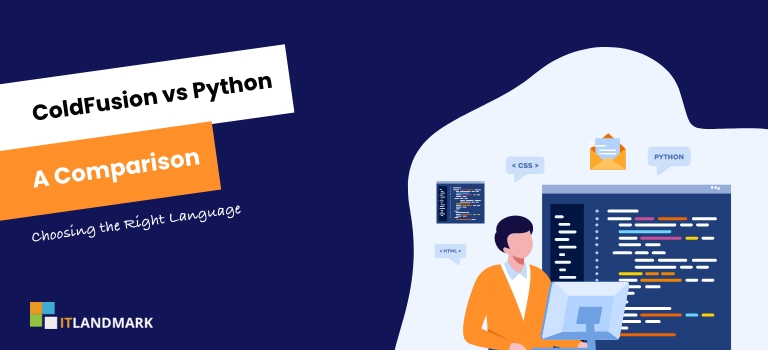
ColdFusion vs Python: Which One is Right for Your Web Project?
Deciding on a programming language for your web project can be tricky. ColdFusion vs Python is a common comparison, as both offer powerful features but cater to different needs. In this article, we’ll explore their differences in terms of syntax and readability, performance and speed, scalability and security, database connectivity, popularity, and community, helping you make an informed decision.
Table Of Contents
- Overview of ColdFusion
- Overview of Python
- Comparing Syntax and Readability
- Comparing Performance and Speed
- Comparing Scalability and Security
- Comparing Database Connectivity
- Comparing Popularity and Community
- Making the Right Choice for Your Project
- Frequently Asked Questions
- Conclusion
Overview of ColdFusion
When it comes to building dynamic webpages, ColdFusion offers a unique solution that’s been around for decades. With an easy learning curve and rapid development time, the platform is highly cost-efficient and can be deployed in either cloud or on-premise solutions.
Plus, its streamlined workflows make it perfect for established companies looking to quickly update their online presence. ColdFusion allows developers to focus more on the content of websites by taking care of many of the technical aspects behind the scenes—including database integration and security protocols.
It also supports multiple programming languages like HTML5, CSS3, JavaScript, AJAX, XML, CFX tags (for customizing applications), CFML (ColdFusion Markup Language) and SQL Server. The scalability of ColdFusion makes it ideal for large businesses with massive projects as well as small teams with limited resources who need a reliable web application framework.
As such, this powerful technology has become increasingly popular due to its ability to deliver fast results without compromising on quality or performance. By harnessing these capabilities into one comprehensive package, ColdFusion provides users with an efficient way to create innovative websites that are both engaging and effective.
With all these features at hand, it’s no wonder why ColdFusion remains one of today’s leading web development technologies.
Also Read: ColdFusion Vs Other Programming Languages
Overview of Python
Imagining a world of endless possibilities, Python provides developers with the tools to build remarkable web applications. It is an open-source programming language, which allows it to be easily modified and improved. Its Object-Oriented Programming (OOP) makes it an extremely versatile option for application development. As such, it has become one of the most popular languages in recent years due to its ease of use.
Python also offers excellent documentation quality that can make learning easier for beginners. Additionally, browser compatibility should not be overlooked when developing web applications with Python – as long as HTML5 is supported on the user’s browser, almost any type of client side scripting can be used without having to worry about different versions or platforms.
Furthermore, refactoring support helps ensure code accuracy while third party libraries provide access to a variety of pre-built modules so you don’t have to write your own from scratch every time you need them.
Overall, Python offers many advantages over other web development frameworks when creating complex applications and websites. Through its powerful features combined with its intuitive syntax and readability, it’s no wonder why so many developers are turning towards this amazing language when tackling new projects.
With these benefits in mind, let us now move on to compare how ColdFusion and Python stack up against each other in terms of syntax and readability.
ColdFusion vs Python: Which is Better?
Discover the differences between ColdFusion and Python for web development and make an informed choice. Explore their features, performance, and community support to determine which language suits your project needs.
1. Comparing Syntax and Readability
Syntax refers to the structure and grammar of a programming language, while readability refers to how easy it is for humans to understand the code.
Both ColdFusion and Python offer advantages in these areas:
ColdFusion: ColdFusion uses a tag-based syntax that can be easier to learn for beginners. For example, a simple loop in ColdFusion might look like …, whereas Python would use indentation and keywords like for and in.
Python: Python is known for its clean and concise syntax, often resembling natural language. This can make it easier to read and maintain complex code.
The choice between ColdFusion and Python for syntax and readability depends on your project and developer experience. For projects requiring rapid development with a focus on ease of use, ColdFusion’s tag-based syntax might be a good fit. For projects where code maintainability and readability are crucial, Python’s clean syntax could be advantageous.
Also Read: Best ColdFusion Hosting Providers
2. Comparing Performance and Speed
For a smooth-running web application, performance and speed are crucial. While both ColdFusion and Python offer optimization strategies, there are key differences to consider:
ColdFusion: ColdFusion excels in compiled code execution, potentially leading to faster performance for specific tasks. However, its reliance on a virtual machine might introduce some overhead compared to Python’s direct interaction with the operating system.
Python: Python’s interpreted nature can sometimes lead to slower execution compared to compiled languages like ColdFusion. However, Python’s mature optimization tools and extensive libraries can often compensate for this. Additionally, Python’s Global Interpreter Lock (GIL) can limit performance in multi-threaded applications.
Ultimately, the best choice depends on your project’s specific needs. For computationally intensive tasks, Python’s libraries might offer an edge. For applications prioritizing initial load time, ColdFusion’s compiled code could be advantageous. When it comes to performance tuning, both ColdFusion and Python offer efficient solutions such as variable caching and memory management techniques. But while Python has more mature tools available for developers looking to optimize their projects, ColdFusion also provides some automation benefits with its built-in dynamic scripting capabilities. On top of this, many frameworks exist for both languages which allow developers to customize their coding environment according to specific needs like scalability or security requirements.
Carefully consider these factors alongside project complexity and desired functionality. Benchmarking different approaches for your specific use case can also be helpful in making an informed decision.
3. Comparing Scalability and Security
Scalability and security are essential for any web development project. Here’s a breakdown of how ColdFusion and Python address these concerns:
Scalability:
ColdFusion: ColdFusion’s tag-based syntax is beginner-friendly and simplifies integration. However, for highly complex applications with intricate data models, its structure might become cumbersome to manage as the project scales.
Python: Python’s object-oriented nature offers more flexibility for building large-scale applications. It allows for modular code organization and reusability, making it easier to handle complex data structures and maintain the codebase as the project grows.
Security:
ColdFusion: ColdFusion boasts robust debugging features that aid in identifying and resolving security vulnerabilities. However, this can add complexity to the platform itself.
Python: While Python offers fewer built-in debugging tools, it grants developers more granular control over individual program components. This allows for a more customized approach to security, but requires a deeper understanding of potential vulnerabilities.
Both ColdFusion and Python offer strong encryption libraries and secure authentication options. The best choice depends on your project’s specific needs. If you prioritize ease of use and value built-in debugging features, ColdFusion might be suitable for smaller or medium-sized projects. For large-scale applications requiring maximum flexibility and control, Python’s object-oriented approach might be a better fit.
Pro Tip
When comparing scalability and security, always take the time to evaluate the security protocols and features offered by the platform before making a decision. Don’t just assume that one is better than the other; do your research and make an informed choice.
Also Read: ColdFusion Vs PHP
4. Comparing Database Connectivity
Connecting your project to a database securely and reliably is crucial. Both ColdFusion and Python offer robust solutions:
ColdFusion: ColdFusion provides multiple ways to connect with databases:
1.Built-in ORM (Object-Relational Mapping) support simplifies data access by automatically mapping database tables to objects in your code, reducing boilerplate code and improving maintainability.
2.Various database drivers and tools offer flexibility for connecting to different database types.
3.ColdFusion’s own query syntax (CFQuery) is familiar for SQL users.
Python: Python’s extensive library ecosystem shines here. You can find libraries that provide an interface to virtually any database type. These libraries often allow using familiar SQL syntax for querying data, promoting code maintainability across projects. Additionally, many support advanced database features like stored procedures.
Ultimately, both languages excel in database connectivity. Consider these factors when making your choice:
Ease of use: ColdFusion’s built-in ORM simplifies data access, especially for beginners.
Security: Evaluate each language’s security features and best practices to ensure your data is protected.
Performance: If performance is critical, benchmark both approaches for your specific use case.
By considering these factors, you can make an informed decision about which language best suits your project’s database connectivity needs.
Also Read: ColdFusion Frameworks
4. Comparing Popularity and Community
While both languages offer strong developer communities, Python’s larger user base and open-source nature might provide some advantages:
Finding solutions: A broader community often translates to more readily available solutions to problems you encounter during development.
Learning resources: A wider range of tutorials, documentation, and online courses simplifies learning and troubleshooting.
Ultimately, the best language depends on your specific project:
ColdFusion might be a good fit for:
Developers already familiar with the Adobe ecosystem.
Projects requiring a rapid development platform with built-in features like security and debugging.
Python might be a good fit for:
Projects requiring a high degree of flexibility and scalability.
Developers seeking a future-proof language with a large and active community.
In terms of cost analysis, both languages are relatively inexpensive given their relative power and ease of use.Ultimately there isn’t a single answer when deciding whether ColdFusion or Python is better for web development.
It really depends on what kind of project you’re working on and how much effort you want to put into finding the best solution from either platform.
To ensure success, research both platforms thoroughly by looking at user reviews online and exploring sample projects created using each language until you find the perfect fit for your own project!
Making the Right Choice for Your Project
To determine the best language for your project, take the time to explore and evaluate each of their unique features and capabilities so you can make an informed decision.
ColdFusion provides several frameworks that simplify web development projects while Python offers a wide range of open source libraries available to developers.
It’s important to consider cost factors in addition to performance and scalability when evaluating these languages for your project; however, it is also worth noting that both are platform agnostic which means they can be used on any operating system with minimal effort.
The learning curve associated with mastering either language varies depending upon one’s experience level; therefore, it is essential to assess how quickly the team will become proficient before deciding which language to use.
While there are numerous tutorials and resources available online for free or at a low cost, more complex tasks may require additional assistance from an experienced developer who is knowledgeable about either ColdFusion or Python.
Additionally, many organizations provide formal training programs designed to help new users get up-to-speed as quickly as possible.
Ultimately, making the right choice between ColdFusion versus Python comes down to assessing various criteria including cost analysis, toolsets, framework support, scalability, ease of use and maintainability.
Developers must carefully weigh all these elements against their current skillset and future goals in order to make an educated decision for their specific web development project.
Also Read: Best ColdFusion Alternatives
Frequently Asked Questions
What are the advantages of using either ColdFusion or Python for web development?
If you’re looking to develop a website, ColdFusion and Python both offer advantages that can be used to create an innovative online experience for your visitors. But which one should you choose? To compare the two, consider their performance comparison, learning curve, security measures, documentation accessibility and hosting options. As far as performance goes, ColdFusion offers better performance than Python in most scenarios but may require more resources to achieve optimal results.
The learning curve with both is relatively easy compared to other languages so getting up and running shouldn’t take too long. When it comes to security measures, ColdFusion includes built-in features like encryption while Python requires third party libraries for added protection. Documentation accessibility is great with both since there are plenty of tutorials available online and offline. Finally, when considering hosting options both have excellent choices depending on the type of project you need. All things considered, it’s important to carefully evaluate each language before making a decision about which one is best suited for your web development needs.
What types of projects are best suited for ColdFusion and Python?
When developing a web application, it is important to consider the portability, security, scalability, compatibility and performance of both ColdFusion and Python. This decision requires an insightful analysis as they each have their own unique strengths that must be considered in relation to one another. Think of them like two sides of a coin – while on one side you might find the power and flexibility of Python appealing for its ability to handle complex tasks with ease, the other side reveals ColdFusion’s robustness and scalability when faced with large volumes of data. Ultimately, depending on your project goals or desired outcome, either technology can provide an innovative solution but understanding which type of projects are best suited for each will help maximize your potential success.
How much experience is needed to be successful when using ColdFusion and Python?
If you’re considering using ColdFusion or Python for web development, understanding the learning curve of each programming language is essential to your success. Although it may take some time to become a proficient programmer no matter which one you choose, debug options on both platforms are strong and allow users to quickly identify errors in their code. Additionally, depending on the project, scalability potential can differ greatly between the two languages and security risks should also be taken into account. Finally, database integration with both tools is fairly straightforward but there will likely still be challenges along the way.
Are there any additional costs associated with using ColdFusion or Python?
When considering the costs associated with using ColdFusion or Python for web development, you must take into account more than just software licensing fees. Depending on your specific requirements and objectives, additional costs may include support services, security considerations, hosting options, performance optimization tools and documentation availability. Consequently, it is important to not only evaluate the upfront cost of a particular technology but also consider any hidden expenses that could arise during implementation or ongoing maintenance.
How will my choice of ColdFusion or Python affect the overall cost of development?
Choosing between ColdFusion or Python for web development will affect the overall cost of the project. When deciding, you should consider the learning curve associated with each language, the quality of documentation available to guide your progress, the level of community support you can leverage when challenges arise, and security features that may be included. Additionally, it’s important to factor in scalability potential so your application has room to grow as needed. Ultimately, careful consideration of these factors is key to getting an accurate assessment of total costs involved in developing a website with either language.
Also Read: ColdFusion Vs .NET
Conclusion
Are you wondering which language is best for your web development project?
Look no further than ColdFusion and Python!
Both languages offer great performance, scalability, security, database connectivity and extensive community support.
The choice between them can be overwhelming – but fear not!
With a little research into the differences in syntax, readability, speed and popularity, you’ll be able to make an informed decision that will take your project to the next level.
Put simply: when it comes to web development projects, ColdFusion and Python are like two peas in a pod – irreplaceable powerhouses of coding excellence.
So don’t wait any longer – let these amazing languages help you create something truly remarkable today!



